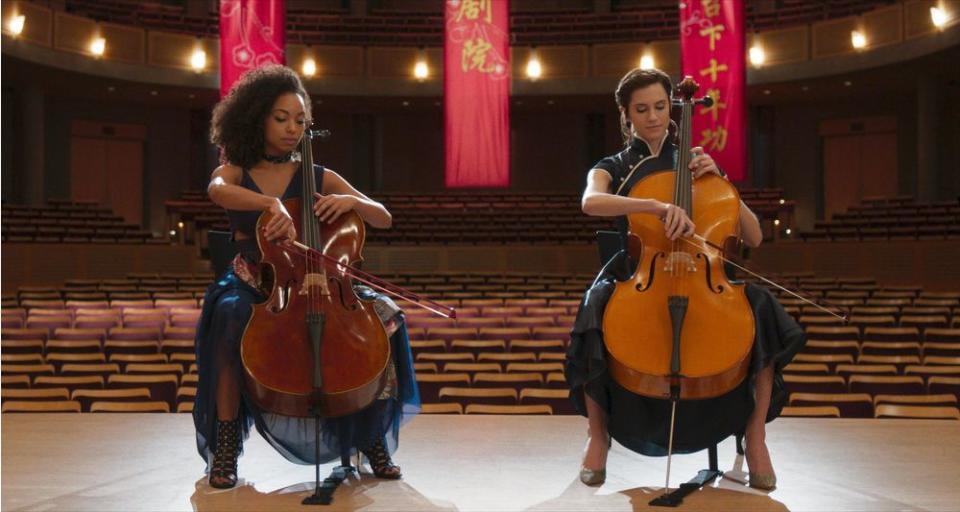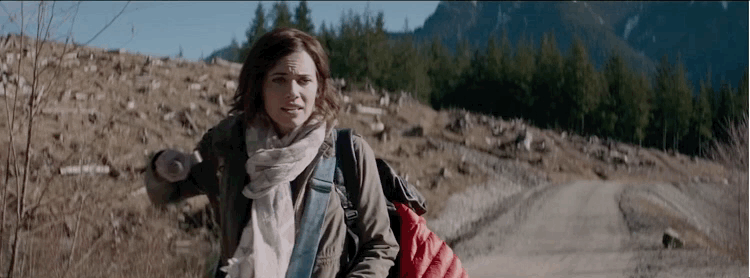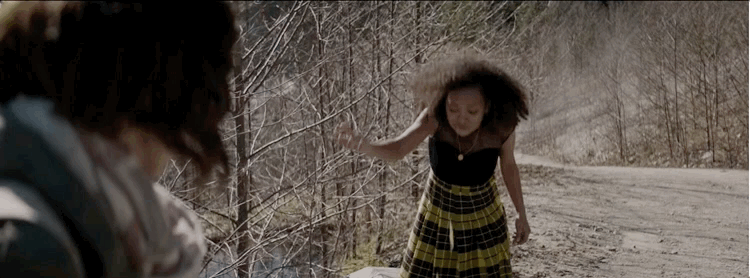The Perfection stars on surrendering to the madness of cellos and violence
A version of this story appears in Entertainment Weekly’s special double music issue. You can buy it on stands now, or here. Don’t forget to subscribe for more exclusive interviews and photos, only in EW.
Is it Showgirls for elite cellists? A bloody creature feature? A breakneck-paced crime-thriller inspired by the gritty carnage of hardcore Korean cinema? The beauty of Netflix’s bold, bonkers, brilliant, genre-defying hybrid The Perfection (out May 24) is that, at any given moment, it’s all of those things and more. Ahead of the Richard Shepard-directed film’s debut — which is sure to shock and amuse even the most hardcore genre fans — stars Allison Williams and Logan Browning, who play rival cellists bound by a grim secret (one too shocking to reveal here), tell EW what it was like to venture down an uncertain path mutually assured in their desire to throw audiences for the wildest loop of the year. Read on for the full (spoiler-free) conversation.

ENTERTAINMENT WEEKLY: I imagine this film resonated with both of you more than just because these are great characters for actors. What spoke to you about the film and what it says about power against the powerless?
ALLISON WILLIAMS: My need to do it and participate in it didn’t become clear to me until the end. If you stopped the movie every 20 minutes and were asked what it’s about or what you think is happening, you’d be wrong until it’s over. And that was the same experience I had while reading the script. By the end, my most pressing urgency in my desire to do the movie was something that hadn’t even entered my consciousness when I [finished] reading the script, so I think that’s also going to be experienced by the viewer…. it’s not until you watch it a second time that you can absorb the other acts of the movie.
LOGAN BROWNING: You almost forget the other insane things that happen [earlier in the film], because it’s packed with so many other twists.
Do you think the movie’s themes benefit from being told via this unorthodox structure with so many tonal shifts?
WILLIAMS: Yes, because life doesn’t occur linearly, obviously, and when there’s something that has happened or is happening or is about to happen to someone who is going to be intense, it almost never announces itself. Anything heavy is handled in a confusing way, because nothing in life happens that tidily. We tap into a world that’s familiar to everyone; under the surface, there’s more than meets the eye. The movie deals with a world in which people masquerade as one thing to continue living another life, so it — even in terms of genre and aesthetic — puts on different masks. It’s convoluted, confusing, and doesn’t make sense until you have some perspective.
BROWNING: The thing I loved about Get Out is that it got an audience to come to the theater that really didn’t know that they were signing up for. That’s what I find thrilling about this film: It does the same thing. It welcomes an audience coming for a specific kind of [genre] movie, but they have no idea what’s really in store. But they’re still enjoying what they did come for. But, it’s also revealed to them that there’s something more, and there’s depth to the story that they couldn’t have anticipated [at the beginning].
What’s that like to keep up with that tone as actors and shift throughout an entire movie?
BROWNING: It’s exciting, because it’s like signing up to do multiple films. We’re playing cello prodigies, we’re on this crazy trip, I’m not going to spoil it, but it takes a lot of mapping out the performance and where your character is, mentally and physically, in the world, and remembering at every stage of it what the ultimate goal of the film is. Sometimes there are points where the film deserves levity because you know where it’s going, and it deserves so much brutality and darkness and violence and gore, so it deserves that balance.

WILLIAMS: Thank you for saying that about Get Out, by the way. It was a similar process of figuring out on a first and second watch performance level. The goal is: the first time someone watches [this], if they’re confused by what my character does, that’s deliberate. That was a constant conversation with Richard: What do we want the audience to be thinking right now? Is it ambiguous? Do we want them to be distrustful? Trustful? Sympathetic? Then, you’re trying to layer it, so that the second time they watch it and they know everything they’re supposed to know, it all still makes sense and looks right. That was the most fun challenge, and I seem to love doing that, because I’ve done it twice now.
The really cool thing is that part of my job is already done, because in the beginning of the movie, we don’t know if we can trust Charlotte, and the last time a lot of people have seen me on screen is in Get Out, so they aren’t sure if they can trust me again, so that’s perfect.
BROWNING: Getting to know you is rough!
WILLIAMS: That made it really appealing to me as an actor, because it’s like playing one person in many different moments.
Richard told me he wrote the film with you in mind, Allison. Is it flattering or perhaps a bit disturbing when someone comes to you and says that you inspired a film like this?
WILLIAMS: That’s such a weird thing to know! I’ve known Richard for years, so that was really funny. It was such a compliment, because Charlotte is so complicated, and the fact that he thought I was capable of doing that [was amazing]. We had so many experiences together on Girls, and it’s like he took the only things I hadn’t done in that world and we got to do it together [here].

Logan, because Richard and Allison already had a bond, did you have to do anything specific to bond with them and meet them on that level of intimacy to feel comfortable in their dynamic?
BROWNING: Yeah, I was doing table dances, I was bringing them coffee. I was like, “Please let me into your club!” It was advantageous that I came into an environment where there was already a camaraderie. The tone and energy when Allison and Richard are together is very focused, driven, and comedic. They riff off of each other well, and it made me comfortable with what we were all diving into, and I felt very welcome. They’re both very genuine. I felt constantly pleasantly surprised at how they were looking at the material from a million different lenses, but also how they welcomed the collaboration.
So, you bonded, but did you have to do any group de-stressing?
WILLIAMS: In our world, it was just sleep. We got to go to sleep! It was fast and intense [but] I don’t look back on it as if it was a stressful experience.
BROWNING: I mean, it was heavy material, and at the end of the day I always felt like maybe I’d been hit by not a metro, but
WILLIAMS: A smaller vehicle!
BROWNING: Yeah! But it wasn’t serious enough that I didn’t want to go back the next day.
On a tamer note: Did you guys have to take cello lessons?
WILLIAMS: We spent a lot of time practicing the cello, even when we weren’t shooting. A couple months! It’s a really hard instrument to play. Physically, to hold a cello correctly is very tricky, so from picking it up to making it look right and then actually playing the music that was written for this movie — which is deliberately complicated — a lot of our free time was spent in cello lessons.
BROWNING: Then, we started doing joint lessons!
WILLIAMS: As we got better and started being able to do our duets, that was funny. I was better at the bowing, but your fingering was perfect.
BROWNING: It became competitive! When we were playing our duets, we learned our parts separately, and there was a point we thought it would be a good idea because we’d be playing on stage together, we should practice together and see each other’s strengths and weaknesses.
It’s more difficult to play cello than commit brutal acts of violence?
WILLIAMS: A thousand times more difficult!
BROWNING: Aren’t we all equipped with being a violent human?
WILLIAMS: We’re all capable of violence; we aren’t all cellists!

The music was also the soundtrack to a sex scene. Who knew cellos could be erotic?
WILLIAMS: There’s something sensual about the way a cello looks: the shape, the way it’s held…. Apparently, the instrumental sound is the closest to the human voice. It’s an intimate experience, playing a cello duet with someone. You have to be in sync. Even the way your bodies are—open yet wrapped around something.
How important was it that the sex scene not be exploitative?
WILLIAMS: We were careful to make it an expression and release [tied to the] character. I’ve done more sex scenes with [director] Richard [Shepard] than I can count. [They previously paired on HBO’s Girls.] I knew he’d handle it well. It was fun, easy, and funny to film. And nice to be like, “[Logan and I] are both wearing the same nudity covering!”
BROWNING: There was a heightened sense in the room during the shoot and even after, in the edit, making sure of what we’re really showing. I remember reading the script and being drawn to that part because it was so beautiful and refreshing, the way it goes back and forth between the cello….. it’s beautiful. I could watch that as a short on its own.
To talk about filming sex scenes, “funny” is the last word I’d expect to hear!
WILLIAMS: Sex scenes are always funny! The craziest s— happens. Everyone’s pretending they’re fine, and no one’s fine. I mean, it’s just bodies near each other; things slip off, or you hit a boom operator with a leg.
BROWNING: The room had a pane of glass windows, and we were like, “Are these tinted?”
WILLIAMS: We were undressed, sitting in the window. I was like, “Can we get confirmation there aren’t people posting up in their offices, turning the lights off, and watching the sex scene? Because, if so, we should perform for them as well, in the round!”
The Perfection premieres Friday, May 24 on Netflix.
Related content:

